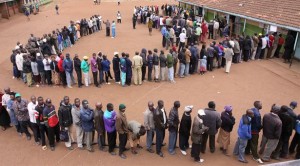On January 12,the high court issued a statement claiming Kenya’s Presidential and parliamentary elections be held March 2013 contrary to the August 2012.However,the elections could also be held in 2012 if coalition partners agree to dissolve the coalition .There has been lots of controversy surrounding the change in dates as different views are aired on the inconvenience of having an election within the start of the year.
In response to the violence after the 2007 presidential election, that divided the country and left dozens dead , the Independent Electoral boundaries commission (IEBC) has introduced several new technologies to ensure more peaceful elections. There has been a creation of a result transmission system, a party registration system and development of voter education messages to explain the new measures. Every piece of technology introduced addresses specific and identified problems.
Two of the key technologies being introduced are biometric voter registration and electronic poll books, both of which address a problem with accountability on Election date. Kenya is known to have several political zones controlled by a single political party that other parties cannot safely observe what goes on in the polling station.
The problem has been noted by observers since 1980s. The ideal long-term approach involves education campaigns for civil society and political parties to encourage greater compliance with the IEBC’s code of conduct. There is however the need to minimize the impact of any possible misconduct within polling stations in such zones.
It is through this elements of technology involved that the IEBC was allocated sh17.5 billion, by the minister of Finace Njeru Githae in the 2012-2013 budget to ensure a smooth election, hence being considered the most expensive election.
Past referendum in kibera.
During the general election period, six elections are to be held, that is, the elections for the president, a member of parliament, a women’s representative in parliament a senator, a county governor and a county assembly member. This means, each valid voter will be entitled to cast six different ballots, as each ballot is for each election, unlike in the past where we only had three ballot papers in one session.
The voting might however be hard and confusing for the illiterate, elderly, the ailing and even the educated but unsure who seem not to know, and also how to be able to distinguish the different ballot papers and cast each ballot in its correct box.
The entire voting session is certainly going to take longer to complete, and if voters are not allowed ample time, they are likely to commit errors during the process, hence this my fail to reflect their intentions of the voters.
The current constitution provides that all these six elections be held in one day in one voting session. The question is, Is it possible to carry out the elections in a day, for the six elections? Might this not result to chaos? What is the IEBC, doing about it?
Currently, the IEBC opted to increase the number of polling stations from 17000 in 2007 to 45,000,meaning that voters will have more time to cast their six ballots than would have been if the case if the number remained at 17000,this is a positive approach that has been welcomed by most Kenyans.
The big number of polling stations will mean that the number of election officials will more than double, and the officials will be presiding officers, deputy presiding officers, polling clerks and security officials.
Whatever the case, the cost of running the polling stations will certainly be far much higher than was in the previous elections, the training includes; training, remuneration, transport and oversight, and this is the result of the huge election budget.
GDP growth rates have historically dropped 2-5% during election years – as in 1992, 1997, 2002, and 2007. In 2007, after post-election violence broke out, GDP growth rate plummeted from 7% to over 1.8%, and is, still recovering today yet we have another expensive election in due course. This is not going to be a comforting statistics in any year, given the trends of the past election years, the situation is going to be more precarious.
Voice of Kibera, the online information sharing platform for citizen journalism, looks forward to covering all the election events in all polling stations in Kibera as they update the world on all that will be revolving around in Kibera.

